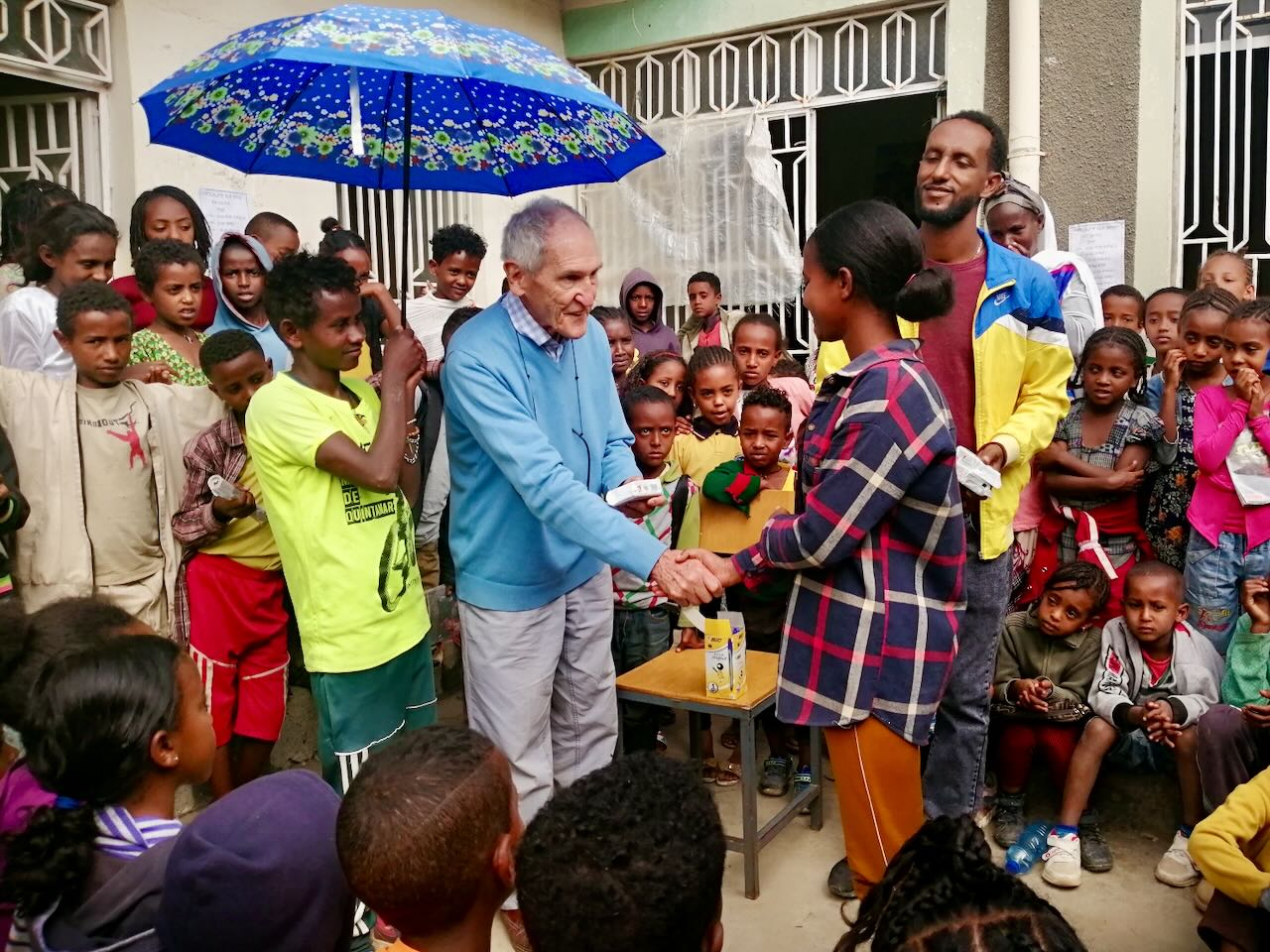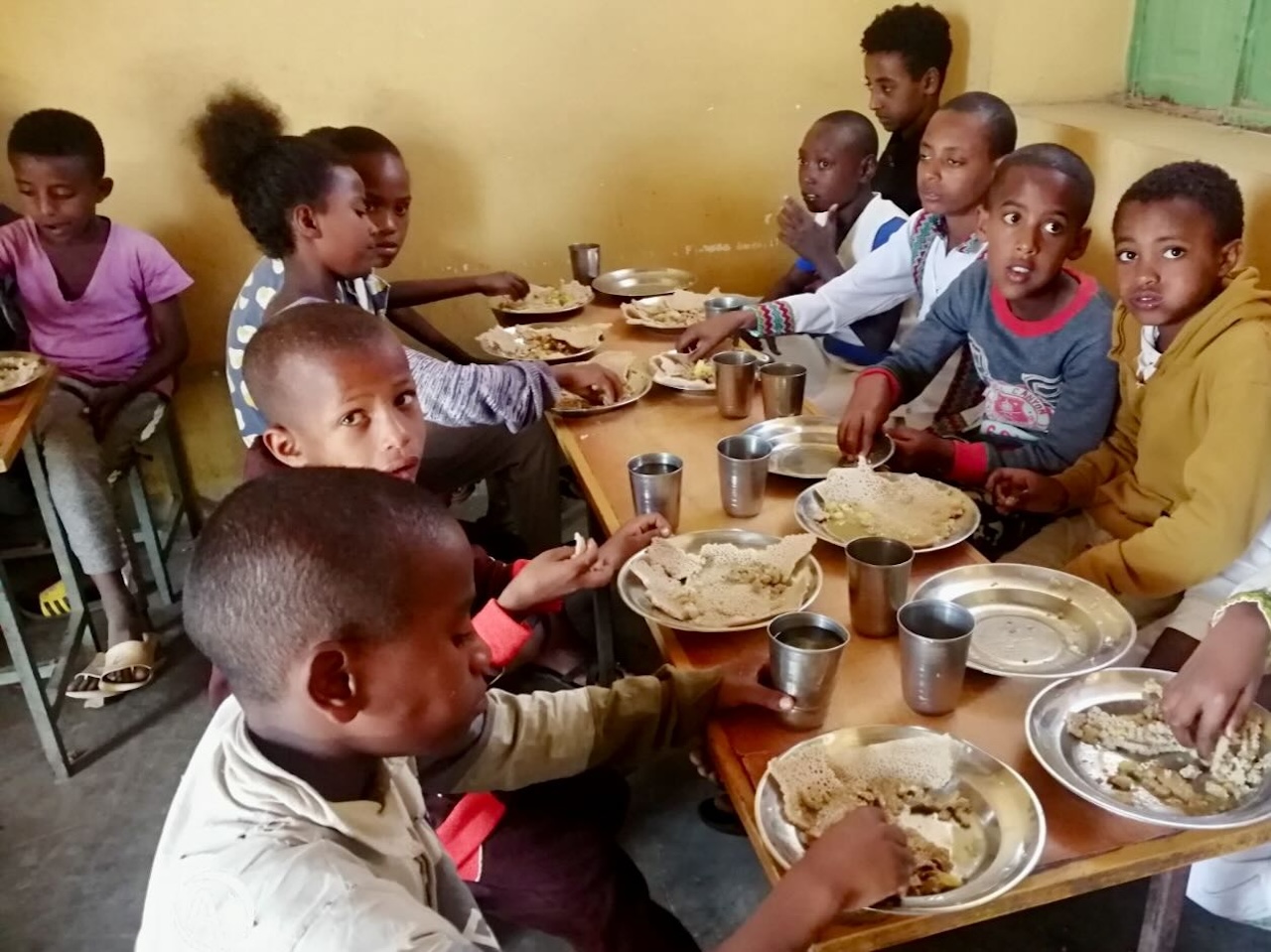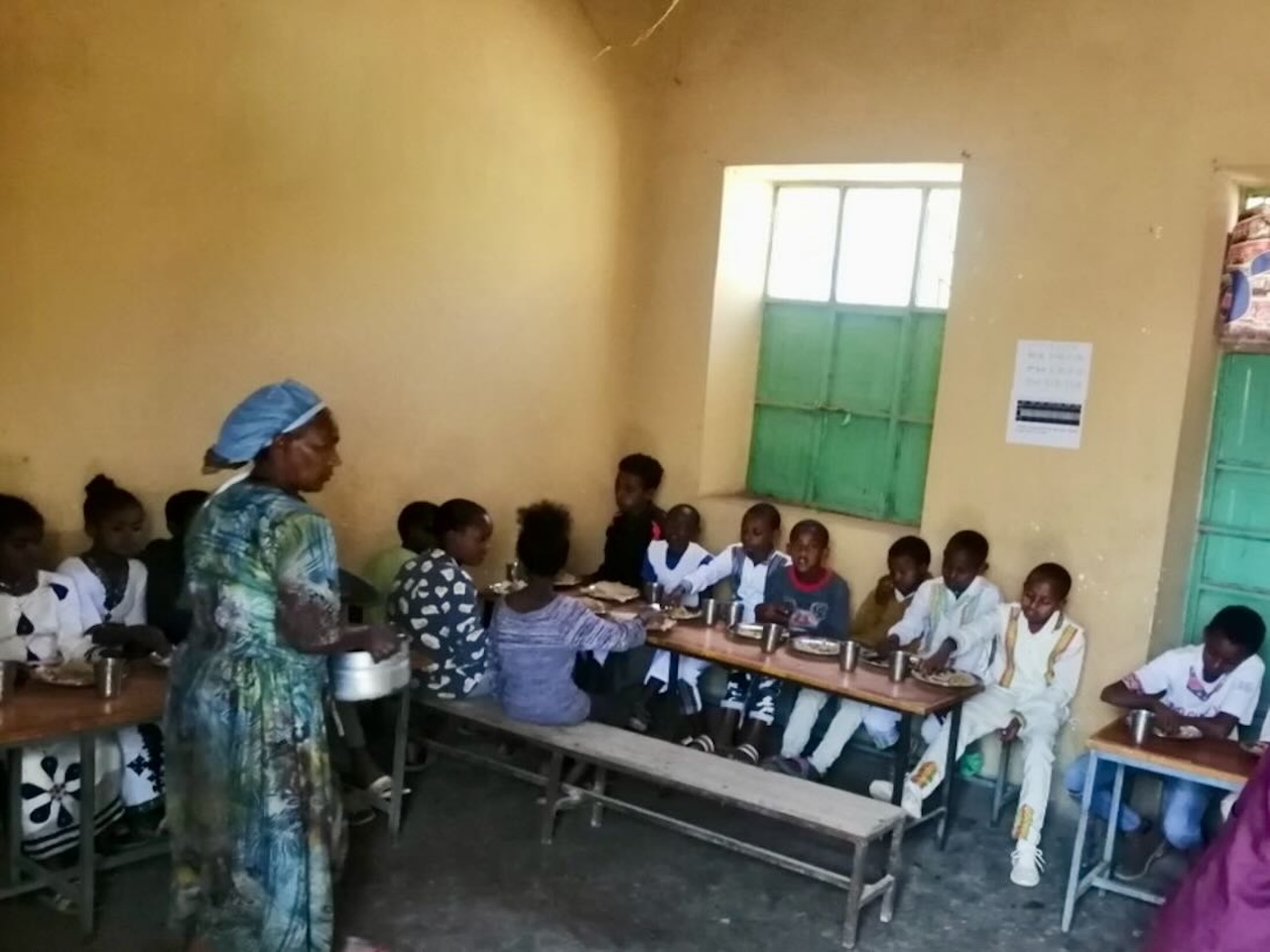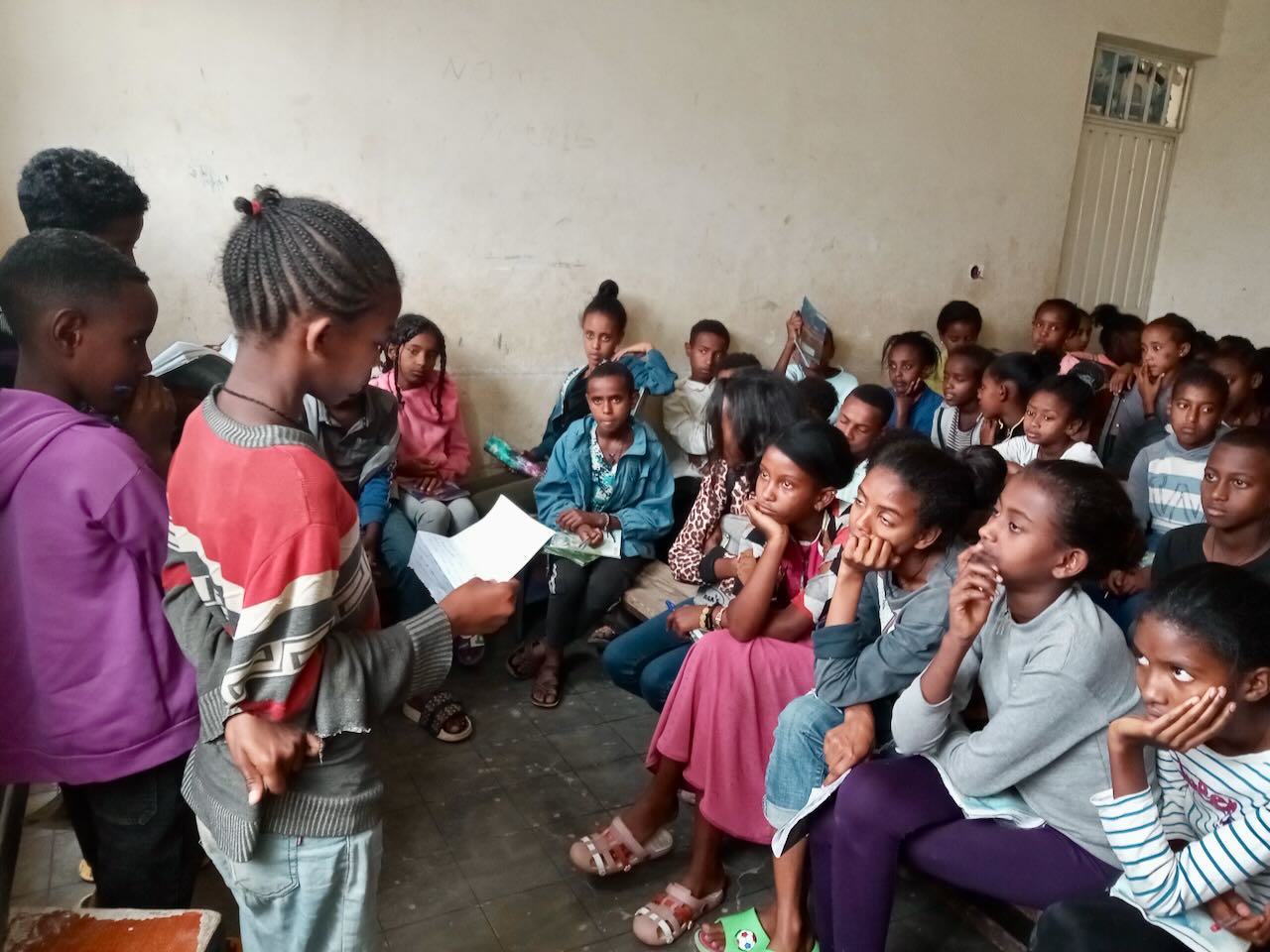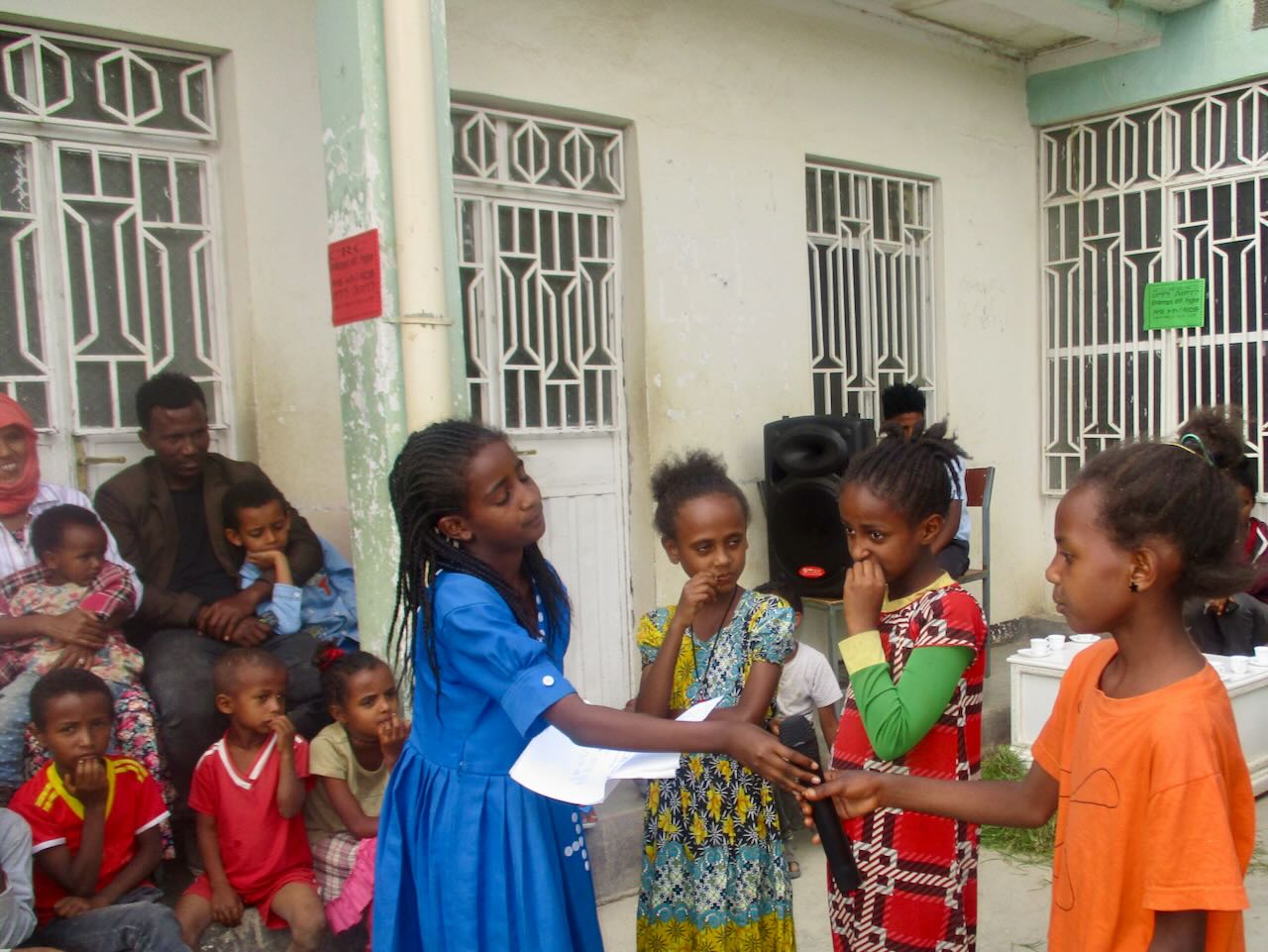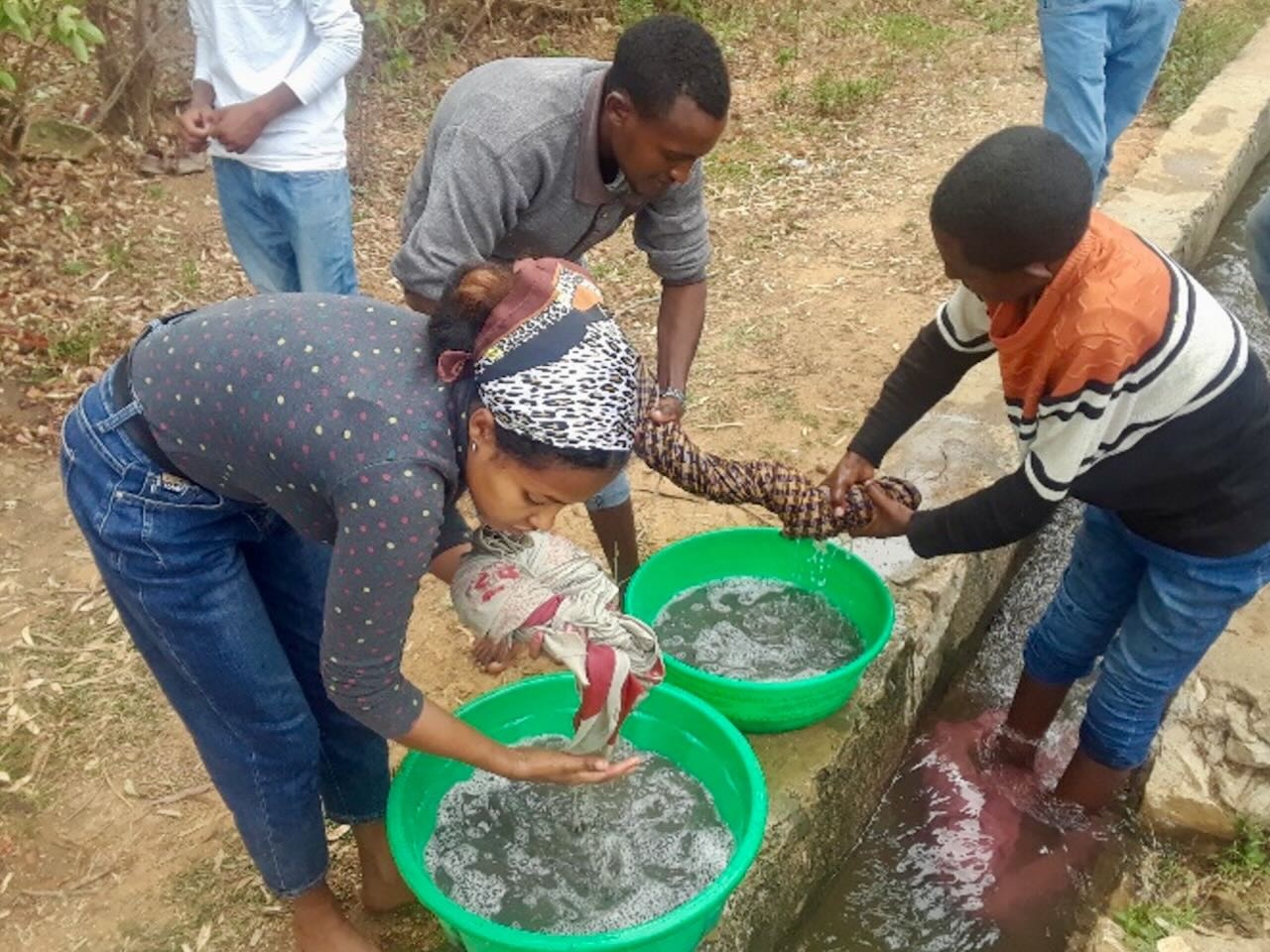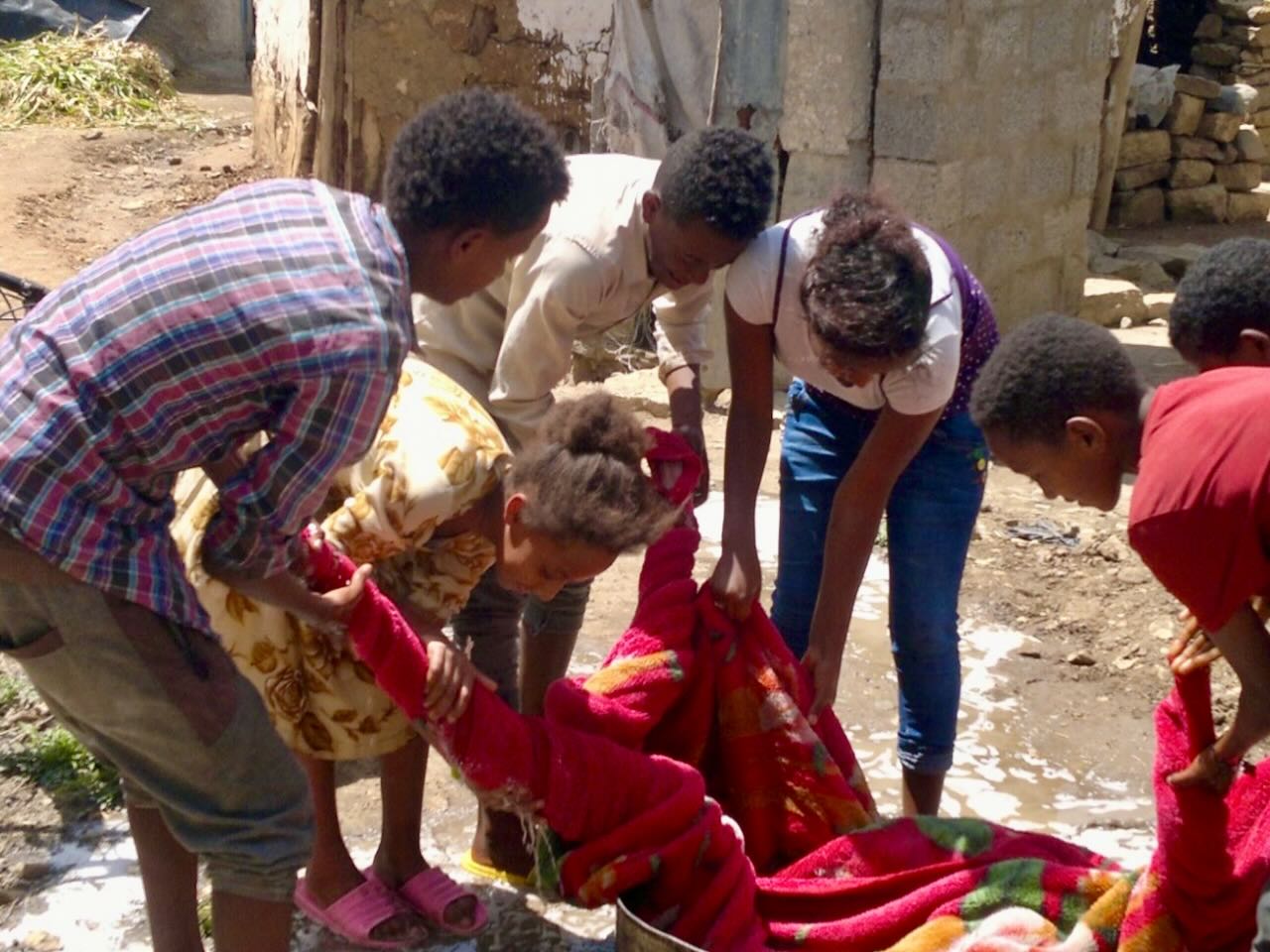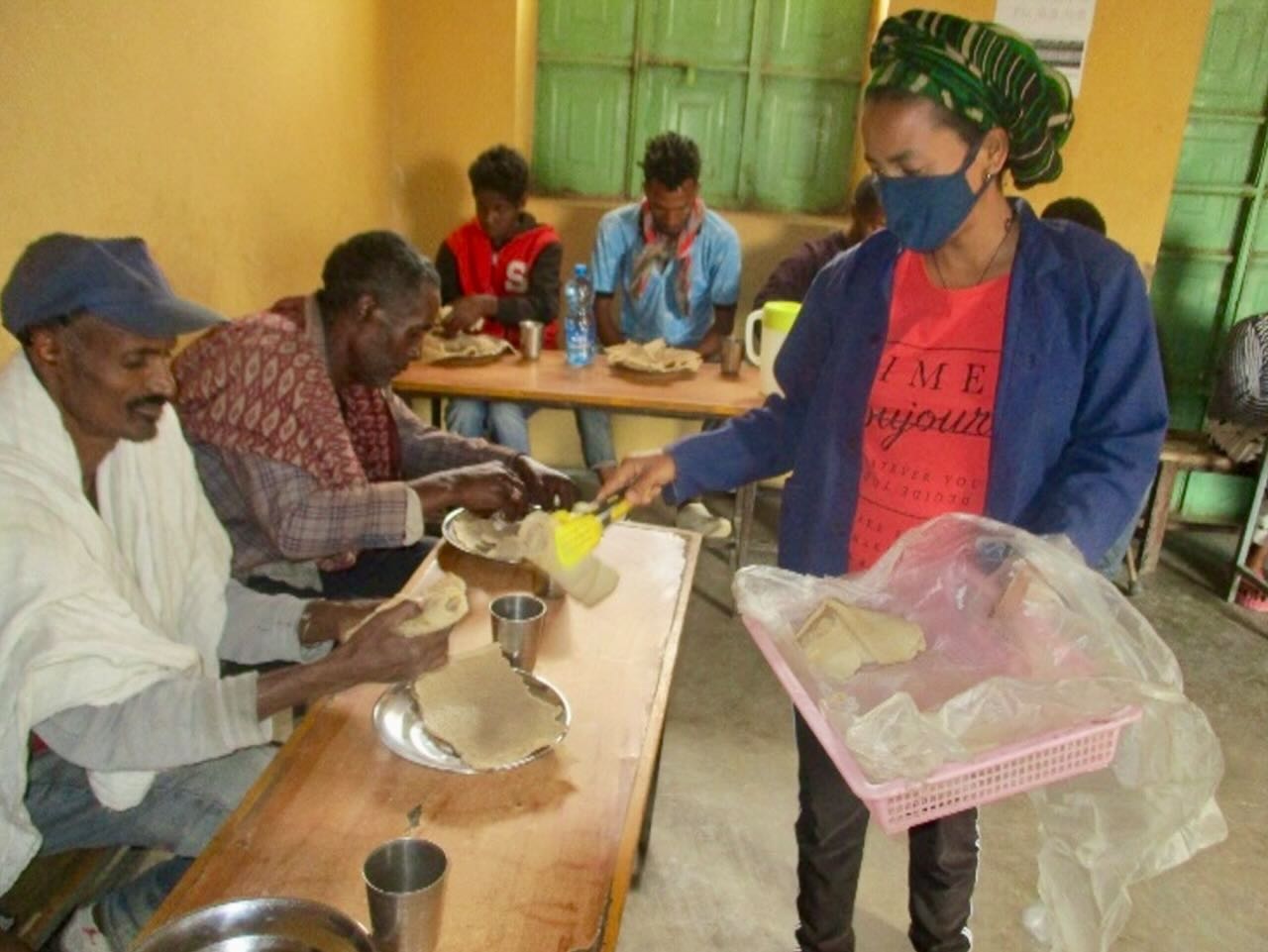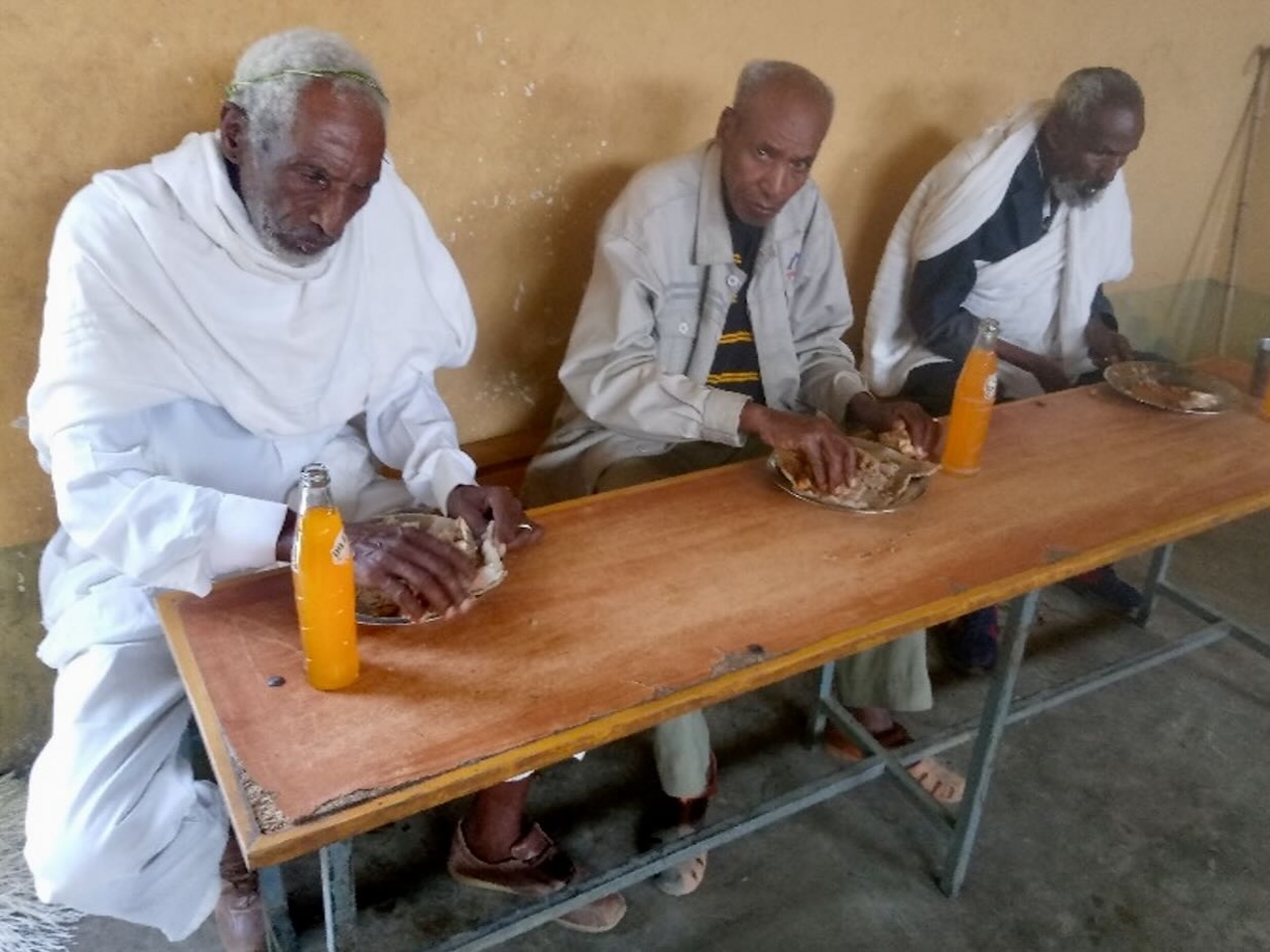Help orphans and helpless people in Wukro
Help orphans and helpless people in Wukro
In a world where compassion and respect are essential, our Foundation shares the proposal of missionary Ángel Olaran to support the Social Development Program of Wukro in assisting orphans and homeless people from Wukro and the Kelte-awlaelo Woreda, in the Tigray region of northern Ethiopia.
470 orphans and vulnerable children: They receive not only financial support for food, medical care, shelter, and education but also love and care, providing them with a ropportunity for a better future.
185 elderly homeless individuals: They are cared for, fed, and receive medical attention, offering them dignity and peace of mind in their golden years.
30 beneficiaries with HIV/AIDS: They receive not only medical treatment but also invaluable emotional support, demonstrating that love and care can overcome even the most challenging illnesses.
With your help, we can expand our reach and bring hope to more people in need. Every donation, large or small, makes a difference in the lives of those who need it most. Your generosity can feed a child, provide shelter for an elderly person, or provide medical care for someone with HIV/AIDS.
Share the project on your social networks, in your community, and with friends and family to reach further and make a greater impact.
In a world full of challenges, love and solidarity are the catalysts for change. Join the project and the mission to bring hope and change lives in the city of Wukro, in the Tigray region of northern Ethiopia.
From our Foundation we support the work of the missionary Angel Olaran, ‘Abba Melaku’ in Ethiopia.
1. Executive Summary
Project Title:
Result #1. Improving the livelihood security of Orphans and vulnerable children in Wukro town and Kelte-awlaelo Woreda.
Result #2. Care and Support for destitute elderly people and people having HIV/AIDS in their blood.
Project Implementing Agency:
Ethiopian Catholic Church – Social and Development Commission, Coordination Office of Adigrat – Wukro Social Development Program (ECC-SDCOAd-WSDP). (Comissió Social i de Desenvolupament de l’Esglèsia Catòlica Etíop, Oficina de Coordinació d’Adigrat – Programa de Desenvolupament Social de Wukro (ECC-SDCOAd-WSDP).
Reporting Period:
January 1, 2024, to December 31, 2024.
2. Introduction
Ethiopian Catholic Church – Social and Development Commission, Coordination Office of Adigrat, Wukro Social and Development Program, (ECC-SDCOAd-WSDP), has been working for many years to support the most affected and poor people through various programs and putting its priority and emphasis in orphans.
During its working period, the project has significantly contributed in reducing the social problems of the people in its operation areas of Wukro town and Kilte-awlaelo. Significant numbers of children are being given the support to get their basic needs and to enable them to think about their future. It was possible to send many children to school that would not have gone to without the support given by the project. A good number of old people, disabled and people living in difficult circumstances have also been supported to lead their normal life.
The project for 2024 includes a total of 470 OVC’s, 185 elderly people, 50 feeding beneficiaries and 30 HIV/AIDS (PLWHA) will receive support under the programme during this period. The project has four social workers and eight foster mothers serving beneficiaries in different aspects based on the seven core services stated on Ethiopian standard guideline of orphan and vulnerable care and support programs. They perform daily home to home and school visit and provide psychosocial support, inspect and solve educational, health, nutritional, hygienic, shelter & cloth and legal problems facing to the beneficiaries.
3. Project goal and specific objectives
-
Goal
The overall Goal of the project is to contribute to the regional government efforts of improving the Livelihood Security of the society.
-
Specific objectives
Result #1. Improving the livelihood security of Orphans and vulnerable children in Wukro town and Kelte-awlaelo Woreda.
SO: #1: Promote the Human Development of Orphan and Vulnerable children in Wukro town and Kelte-awlaelo Woredas.
Result #2. Care and Support for destitute elderly people and people having HIV/AIDS in their blood.
SO: #1: Promoting a safe living environment of destitute and marginalized elderly people and people with mental and physical disabilities.
4. Description of activities
4. 1. Description of activities of 2024
Result #1: Improved Livelihoods of 470 Orphan and vulnerable children in Wukro town and Kelte-awlaelo Woreda
Activity 1.1. 470 OVC Provided Financial Support for Food and Nutrition
Food Allocation
Additional Nutrition
Activity 1.2. Access to Health Services and Sanitation
Medical support and referal to higher hospital
Soap and hair oil
Activity 1.3. Provision of shelter and basic facilities
House rent
Water and electricity (Bills)
Shoe and cloths
Activity 1.4. 470 Orphan and Vulnerable Children Provided Psychosocial Support
Strengthening clubs
Life skills training provision to OVC
Training for SW and mothers
OVC football club participate in town league
Running the multipurpose center
Rent of center
Salary for animators
Salary for a guard and cleaner
Activity 1.5. Providing Basic Education Support to 470 orphan and Vulnerable Children
Provision of School materials
Exercise books
Ball pens
Provision of School uniforms
Provision of Tutorial class
Teachers fee
Rent of classrooms
Provision of Vocational training and Covering school fee
Tuition fee for OVC going in private school
COC and other fees
Provision of Support to university Students
Educational support for university students
Transportation for university students
Shoe and cloths for university students
School Day Celebration and Awarding Outstanding students
Awards for outstanding students
Activity 1.6. Income generating activities
Provision of startup capital to 5 OVC Caregivers
Provide working capital to 4 people living with HIV/AIDS to be involved in IGA
Salary for Social workers, mothers and cooks
Result # 2. Care and Support for destitute elderly people and people having HIV/AIDS in their blood.
Financial support for Elderly people
Feeding service for 50 elderly people
Food
Rent of center
Salary of cooks
Salary of Guard
Pension contribution
House rent for 50 elderly people
Monthly financial support for HIV/AIDS people
Covering Medical Expenses for people having HIV/AIDS and elderly people
The programme planned for 2024, with some updates compared to the previous one, will develop activities and cover financial expenses in the twelve months of the year. Below we describe the activities and achievements/outcomes of 2023.
4. 2. Description of activities and Achievements/results 2023. Annual Report of 2023
SO# 1: Promote the Human development of Orphan and vulnerable children (OVC) in Wukro town and Kilte-awlaelo Woredas.
IR-I: OVC provided economic support and access to health services
Economic Support
Through the economic support, 470 OVC were able to have the access to the basic needs of human beings, the food, shelter and cloths.
The economic support has been extended every month to cover the expenses related to the food, house rent, bills and for clothing that was extended once with in the year. The amount of the monthly allocation reduces progressively as the number of members of a family is increased.
Table 1: Total number of OVC in 2023
| S/No | Wereda | Male | Female | Total |
| 1 | Wukro | 156 | 162 | 318 |
| 2 | Kilte-Awlaelo | 87 | 65 | 152 |
| Total | 243 | 227 | 470 |
The current amount (in birrs) of support provided to the OVC is as given below:
Table 2: Current Monthly allocation of OVC
| Nº of Children in a family | Food | Rent/Bill | Soap and lotion | Medical | Total with rent | Total without rent |
| 1 | 545 | 280/150 | 40 | 75 | 940 | 810 |
| 2 | 795 | 350/150 | 50 | 100 | 1295 | 1095 |
| 3 | 1000 | 420/150 | 60 | 125 | 1605 | 1335 |
| 4 | 1200 | 530/150 | 70 | 150 | 1950 | 1570 |
| >=5 | 1380 | 650/150 | 80 | 175 | 2285 | 1785 |
As a result of the economic support the lives of the children were secured, and they were able to grow like any child in their communities. The proper use of the finance has been followed by the social workers and mothers with a close collaboration of the care givers of the OVC.
For very young children who cannot cook their own food and who have not got any adult living with them, cooks have been assigned to prepare their daily meals. Hence during the reporting period, 13 cooks have been giving services to 19 OVCs or 14 child headed families living in Wukro town.
Health care
The expenses related to the medical treatment of all the beneficiaries in all the programs have been covered by the office. The expenses are settled when the treated beneficiary brings receipts from governmental hospitals or health centers. Every child under our program is insured to medical expenses including the referrals up to Addis Ababa. 100 OVC care givers who are economically weak and dependent in our program support were also planned to cover their medical expenses. During the reporting period, 54 orphans and 28 orphan caregivers have settled their medical expenses.
The figures in the above statement, one beneficiary may settle his/her medical expense once, twice or more times, therefore the number of beneficiaries who got medical support is lesser than the total number of trips beneficiaries went to health centers.
There are also OVC who are permanently sick such as children HIV positive, children with heart problem, mentally retarded and physically disabled. These children are given special care and attention for their high level of vulnerability.
IR-II: OVC provided access to Educational and Vocational training services
OVC need to receive educational, vocational and occupational opportunities in order to become productive adults.
OVC under the program have been given the necessary support and follow up in order to be able to attend their academic properly.
School Material distribution
Hence, the program has provided to all OVC students the required school materials such as exercise books, pencils, ball pens and school uniforms. The registration fees and the monthly tuition fees for the OVC going to private schools have also been covered.
Educational support for university students
Currently, there are 33 OVC who were attending their studies in different universities of the country out of which 5 are newly admitted for the 2023/2024 academic year. The program has therefore extended a monthly educational support of Birr 300 for photocopies and stationery materials and transportation cost to and from their respective universities as per the tariff. Every fresh man student is also provided blanket, bed sheet and bag. Exercise book and pen is provided for all the students every year. 17 students out of the above number have graduated in undergraduate level in 2023.
Tutorial classes
To help the children to perform better in their studies, tutorial classes have been arranged and given for one month every Monday up to Thursday in our multipurpose center.
During the year, about 127 OVC from Wukro town students in 3 sections have attended the tutorial and this has been provided to those students of grade 7 and above in the important subjects such as Mathematics, English and, Chemistry and physics. Therefore, the program must strengthen the tutorial classes in the coming academic year with special emphasis to be given for the students who are low performers. This tutorial class is given for orphan student beneficiaries living in Wukro town.
Mini library service
In addition to the tutorial services the program has been providing a mini-library service for OVC students interested in reading additional materials in the multipurpose center. These materials are very helpful to improve their school performance and are directly related to the subjects the students take in their regular classes. Physics, chemistry, mathematics, English, civics and other important books are available in the mini library. During this reporting period students were using the books by borrowing them for one week and renew their borrowing weekly. As there is shortage of books in their school and public libraries, our mini library really contributes to solving the problem by offering the OVC with an access to books that they cannot access them easily. However, the books available are still not enough to cover the needs of the students in the program. In addition, the center has been organized Network study for grade 8, 9, 10 and 12 and Entertainment facilities and clubs show put in place.
Question and answer contest
To improve the school performance of the OVC and create sense of positive competition, question and answer contest has been conducted among selected OVC on main subjects such as Mathematics, English, Physics and chemistry. 49 OVC have participated in the contest from grade 5 – grade 10.
IR-III OVC provided Psychosocial Support
Psychosocial support is crucial to provide OVC with the human relationships necessary for normal development. It promotes and supports the acquirement of life skills that allow adolescents in particular activities such as school, recreation and work and eventually live independently.
Home and school visits
Home to home visits and school visits are conducted by the social workers and caring mothers to see if the OVC are fed well, the housing condition, hygiene and sanitation, health, relation with their care givers and family, learning. In general, it is made to follow the proper growth and development of the OVC. Through the visits, follow ups and corrective measures are taken if any problems are encountered.
The social workers conduct the visits Monday to Thursday whereas on Friday they do office works. The caring mothers do the visits every day by visiting every house of OVC under them. Through the visit the social workers and mothers consult the beneficiaries and discussed with their families on issues like the feeding condition, the proper administration of the money, education, good personality, personal hygiene and strengthening the existing relation among the family members. Social workers have two categories of OVCs for their visit, i.e., Special case OVCs and Regular case OVCs. Every social worker should have therefore, to visit at least twice in a month for the special case OVCs and at least once in a month for the regular ones. Social workers and caring mothers visit beneficiaries at their home, school and hospital to follow their day-to-day conditions.
For OVC living in rural areas, the social workers have made four visits, once in every quarter to see the proper growth and development of OVC in the rural areas. These activities are common to all social workers, in all time to all beneficiaries.
Foster Parenting
OVC who have not got any extended family living with them are followed through caring mothers.
Caring mothers conduct regular visit to the child house, providing culturally appropriate methods, they play the role of advocate, teacher, counselor, bridge to the community and the helping institution, the love, stability, guidance and discipline that all children need.
As children living in child headed households have strong need for psychological support, mothers during their regular visit play an important role in fulfilling these needs. OVC, mainly those who live alone are exposed to different abuses such as sexual, they may be obliged to practice theft, drink alcohol and practice to drugs. Therefore, in reducing these kinds of risky issues, the mothers play an important role in following the day-to-day life practices of the children. The importance of the mothers on hygiene of the children is obvious.
Therefore, during this reporting period 64 child headed households having 91 OVCs have been supported by caring mothers. One caring mother report all the findings about the beneficiary under her supervision to one social worker. This would help to have clear information on the beneficiaries by both the social worker and mother. Social workers arrange their time with caring mothers and discuss over the situation of beneficiaries under care in addition to the weekly meeting they conduct together.
Counseling Services
Counselling has a major role in assisting the orphans to lead a positive life. Due to the existing stigma and discrimination, trauma from loss of parents/being infected, and economic vulnerability, orphans vulnerable children are susceptible to different psychosocial, reproductive health and other related problems. Not only that, there are orphans and vulnerable children who have mental problems, behavioral problems which they have developed due to their vulnerability and exposed to such social problems, so the social workers provide counseling service for these beneficiaries who are in need every Friday. The counseling service is rendered for students having mental and psychological problems, detained students if they have psychological problem which may be factor for their detaining in classes and deal their reasons to help them in their progress.
Therefore, during this reporting period, 79 OVCs with academic, behavioral, psychosocial and emotional problem have been given counseling services and were provided counseling service to improve their academic performance, lead settled and normal life, and have better discipline in and with the society.
Clubs’ Activities
It is vital to build-up self-confidence through creating favorable environment in which they can improve their innate talents besides their formal education. To make this effective, four clubs have been established formerly and were still active during this reporting period in which 245 OVC participated in the different activities of the clubs. The clubs are anti-HIV/AIDS club, environment, Reading and Child Rights Club (CRC). Each club has set a working plan and elect leaders from themselves. Moreover, to coordinate the activities of the clubs, a social worker (from the existing staffs) is assigned in each club. Every Saturday each club presents its show like poems, dramas, talents, dances question & answer contest and other entertaining and educational programs.
Life Skills Training
Life skill training was found to be so important to beneficiaries so that they are equipped with all the life skills to overcome all challenges they face during their day-to-day life. Taking this into consideration, the social workers, having taken the life skill training of trainers, have planned to give training to 160 adolescents from grade 7 – grade 12 students. Accordingly, training was given to 140 OVCs from grade 7 – grade 12 students for four days. The training was helpful to the OVC to overcome the challenges they face daily. The training focused on skills such as stress management, anger management, problem solving, Anxiety management, Decision making, communication etc.
Home based care services
At the Beginning of February 2023 and during summer about 130 volunteer OVC with foster mother and social workers had organized home based care service to 31 Elderly people under support of WSDP to those who have no one to take care of them in hygiene and sanitation. The OVC served them by washing their clothes, houses and surrounding and this help created good environment to nearby people to think deeply in helping people around them. The beneficiaries have been getting home based care services more than one times.
Monitoring
During the reporting period, regular monitoring of activities on the ground has been made to see the implementation of the activities according to the plan. In doing so, methods like regular visits, regular meetings, and reports from social workers and mothers were used.
In monitoring the activities of both social workers and caring mothers, the director and coordinators, have been conducted supervisory visits to evaluate the implementation of the project on the ground by visiting randomly some OVC households to observe the overall services being rendered by the program.
A weekly meeting of the social workers and caring mothers is also another monitoring method used. Through the weekly meeting of problems encountered during the week are discussed and solutions are recommended.
Impact of the program/Summary
Through the intervention of the program, significant number of people living with extreme poverty has been given the necessary support to continue normal life.
First and foremost, OVC, who would have been led a different style of life, were able to pursue normal life like any child in their communities. They can get enough nutrition, go to school, get healthcare services, and play. They have been assisted in their normal growth and development.
As a result of the psychosocial support given the following achievements were registered:
- Improvement in the behavior of children.
- Children developed the spirit of helping others and their environment.
- Disease prevention awareness of beneficiaries improved, and medical expenses of beneficiaries settled.
Challenges encountered
The main problems encountered during the reporting period were:
- Lack of transportation facility which negatively affected to the effectiveness of the activities of the program.
- Although the discipline of many beneficiaries is improved, there are few beneficiaries who have still disciplinary problems.
- Problems in selection of beneficiaries (Offices of Labor and Social Affairs) sending the same beneficiaries to different partners.
Lessons Learned
To solve the above challenges, we have been doing in collaboration with stakeholders, beneficiaries, parents and training centers. Different awareness creating programs were given to caregivers during payment days and caregivers discussion sessions to inform caregivers take their share and responsibility on the overall growth and development of children.
SO# 1: Promoting a safe living environment of destitute and marginalized elderly people and people with mental and physical disabilities
Feeding Service for Destitute Elderly People
The feeding center for elderly people from Wukro town and Kilte-awlaelo has been providing services to 51 destitute elderly and disabled people who are living alone with no one helping them. These beneficiaries were selected based on the fact that they are unable to feed themselves. They have no one to prepare food and to provide them care. Opening this center was seen as the best alternative to feed them.
They come to the center every day for three meals, breakfast, lunch and dinner. For those who are not able to move because they are old or are sick, there is a social worker who takes the food to their house and gives the services. 16 among the total users of the center, as they cannot go to the center either they are very old or disabled, they get the services at home. 8 from the 51 elder people who have no one to take care and to help them are getting 200 birrs for house rent. Coffee is also served after lunch every day. There are 6 cooks and 1 guard working for the center.
| S/No | Wereda | Male | Female | Total |
| 1 | Wukro | 32 | 18 | 50 |
| 2 | Kilte-Awlaelo | 1 | – | 1 |
| Total | 33 | 18 | 51 |
Medical support
The expenses related to the medical treatment of all the beneficiaries in all the programs have been covered by the office. The expenses are settled when the treated beneficiary brings receipts from governmental hospitals or health centers. Destitute elderly People are with less resistance to different types of diseases and get sick easily. To address the situation, the medical expense of the beneficiaries who are under the program was covered based on the bills they provide. To this end, during the reporting period, the medical expense of 62 elderly people was covered including referrals.
Home based care services
During the reporting period, about 180 volunteer OVC with foster mother and social workers had organized home based care service to 39 Elderly people under support of WSDP to those who have no one to take care of them in hygiene and sanitation. This is number of households served but the number of events of home-based care services more than that because households have got the service more than one times.
The volunteers served them by washing their clothes, houses and surrounding and this help created good environment to nearby people to think deeply in helping people around them and 3 elderly people house was also maintained/repaired during the reporting period.




